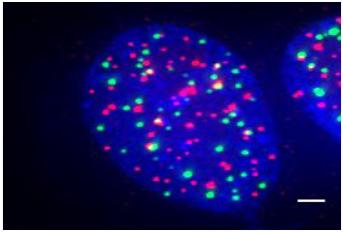Associação Portuguesa de Investigação em Cancro
Alterações do promotor da telomerase em tumores endócrinos do pâncreas
Alterações do promotor da telomerase em tumores endócrinos do pâncreas

Um grupo de investigação do Ipatimup/i3S em colaboração com o IGC reporta pela primeira vez alterações no promotor da telomerase como novo mecanismo de imortalização em tumores endócrinos do pâncreas. Este tipo de tumores era previamente conhecido por usar maioritariamente um mecanismo alternativo para alongamento dos telomeros. As alterações agora descritas representam um novo mecanismo operativo para a imortalização das células cancerígenas e com especial importância em tumores associados a formas hereditárias desta doença.
Vinagre J1,2,3, Nabais J4, Pinheiro J5, Batista R1,2, Oliveira RC6, Gonçalves AP1,2, Pestana A1,2, Reis M1,2, Mesquita B1,2, Pinto V1,2, Lyra J1,2, Cipriano MA6, Ferreira MG4, Lopes JM1,2,5,7, Sobrinho-Simões M1,2,5,7, Soares P1,2,7.
1Instituto de Investigação e Inovação em Saúde (i3S), Universidade do Porto, Porto, 4200-135, Portugal.
2Instituto de Patologia e Imunologia Molecular da Universidade do Porto (IPATIMUP), Porto, 4200-465, Portugal.
3Instituto de Ciências Biomédicas Abel Salazar (ICBAS), Universidade do Porto, 4050-313, Porto, Portugal.
4Instituto Gulbenkian de Ciência (IGC), Oeiras, 2780-156, Portugal.
5Departmento de Patologia, Centro Hospitalar de S. João, Porto, 4200-319, Portugal.
6Departmento de Patologia, Centro Hospitalar de Coimbra, Coimbra, 3041-801, Portugal.
7Faculdade de Medicina da Universidade do Porto, Porto, 4200-139, Portugal.
Abstract:
One of the hallmarks of cancer is its unlimited replicative potential that needs a compensatory mechanism for the consequential telomere erosion. Telomerase promoter (TERTp) mutations were recently reported as a novel mechanism for telomerase re-activation/expression in order to maintain telomere length. Pancreatic endocrine tumors (PETs) were so far recognized to rely mainly on the alternative lengthening of telomeres (ALT) mechanism. It was our objective to study if TERTp mutations were present in pancreatic endocrine tumors (PET) and could represent an alternative mechanism to ALT. TERTp mutations were detected in 7% of the cases studied and were mainly associated to patients harbouring hereditary syndromes. In vitro, using PET-derived cell lines and by luciferase reporter assay, these mutations confer a 2 to 4-fold increase in telomerase transcription activity. These novel alterations are able to recruit ETS transcription factor members, in particular GABP-α and ETV1, to the newly generated binding sites. We report for the first time TERTp mutations in PETs and PET-derived cell lines. Additionally, our data indicate that these mutations serve as an alternative mechanism and in an exclusive manner to ALT, in particular in patients with hereditary syndromes.
Revista: Scientific Reports
http://www.nature.com/articles/srep29714




